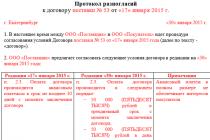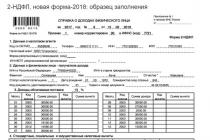As you know, procedures have been simplified for non-profit organizations state registration, reporting and monitoring their activities (Federal Law of July 17, 2009 No. 170-FZ “On Amendments to the Federal Law “On Non-Commercial Organizations””). Based on the fact that a non-profit organization as an owner of endowment is obliged to prepare and approve an annual report on the formation of endowment capital and on the use and distribution of income from endowment no later than six months after the end of the reporting year, we will consider the reporting forms determined by the specifics of the activity. Note also that if such non-profit organization several target capitals have been formed, the specified annual report is prepared for each generated target capital.
In general, the reporting of non-profit organizations can be divided into the following groups:
- financial statements;
- tax reporting;
- reporting to state non-budgetary funds;
- statistical reporting;
- special reporting.
The composition of reporting in relation to a non-profit organization depends both on its organizational and legal form and on the specifics of taxation (in particular, on the applicable taxation regime).
Financial statements
In accordance with Art. 13 federal law dated November 21, 1996 No. 129-FZ (as amended on November 23, 2009) "On Accounting" (hereinafter - Federal Law No. 129-FZ), all organizations are required to draw up financial statements, which includes the following forms:
- balance sheet (form No. 1);
- income statement (Form No. 2);
- statement of changes in equity (Form No. 3);
- traffic report Money(form No. 4);
- annex to balance sheet(form No. 5);
- explanatory note;
- an auditor's report confirming the reliability of the organization's financial statements, if it is subject to mandatory audit in accordance with federal laws.
It should be noted that for public organizations (associations) and their structural subdivisions that do not carry out entrepreneurial activities and do not have turnovers for the sale of goods (works, services, except for retired property), a simplified composition of annual financial statements is established. These organizations submit financial statements only once a year based on the results of the reporting year as part of the balance sheet, profit and loss statement, as well as the income statement. intended use funds received.
In addition, you need to pay attention to the fact that in accordance with the order of the Ministry of Finance of Russia dated July 22, 2003 No. 67n (as amended on September 18, 2006) “On Forms of Accounting Statements”, non-profit organizations may not submit forms No. 3–5 of financial statements in the event lack of relevant data.
Reduced financial statements (forms No. 1 and No. 2) are also submitted to the state statistics bodies.
Since 2003, in connection with the introduction of the USN, many non-profit organizations have switched to the specified special tax regime. Such organizations, in accordance with paragraph 3 of Art. 4 of Federal Law No. 129-FZ are exempt from the obligation to maintain accounting and hence the preparation of financial statements. But at the same time, an obligation has been established for these organizations to keep records of income and expenses in the manner prescribed by Ch. 26.2 of the Tax Code of the Russian Federation. Income and expenses are accounted for in the Book of Income and Expenses, approved by order of the Ministry of Finance of Russia dated December 31, 2008 No. 154n.
Tax reporting
Duty to draw up and submit to provided by law cases of tax reporting in the form of tax declarations (calculations) Art. 23 of the Tax Code of the Russian Federation. The composition of the tax reporting of non-profit organizations directly depends on the applicable tax regime: general or special tax regime. Under the general tax regime, the composition of tax reporting includes without fail:
- tax return for VAT (clause 5, article 174 of the Tax Code of the Russian Federation);
- income tax return (clause 1, article 289 of the Tax Code of the Russian Federation).
It must be borne in mind that the form of the VAT declaration has changed. The new VAT declaration form was approved by order of the Russian Ministry of Finance dated 10/15/2009. The specified form of the declaration has been applied since the reporting for the IV quarter of 2009.
With regard to income tax, it should be noted that in accordance with paragraph 2 of Art. 289 of the Tax Code of the Russian Federation, non-profit organizations that do not have an obligation to pay tax submit tax returns in a simplified form after tax period. It should also be taken into account that the income tax return is applied in the wording of the order of the Ministry of Finance of Russia dated December 16, 2009 No. 135n.
A non-profit organization that owns movable and real estate accounted for on the balance sheet as fixed assets in the manner prescribed for accounting, must be tax reporting on property tax in the form of a tax return and tax calculations for advance payments on property tax, which is enshrined in Art. 386 of the Tax Code of the Russian Federation. It should be noted that earlier an organization that did not have objects of property taxation was still obliged to submit the so-called “zero” tax reporting on property tax. However, now, in connection with the adoption of Federal Law No. 242-FZ of October 30, 2009 “On Amendments to Article 373 of Part Two tax code Russian Federation» organizations are exempted from the obligation to submit calculations and declarations on the property tax of organizations in the absence of an object of taxation.
If a vehicle is registered in relation to a non-profit organization, then it is obliged to draw up and submit a tax return and tax calculations for advance payments for transport tax (Article 363.1 of the Tax Code of the Russian Federation).
If a non-profit organization has the right to own a land plot or the right to permanent (unlimited) use of it, then it is required to prepare a tax return and tax calculations for advance tax payments (Article 398 of the Tax Code of the Russian Federation).
Non-profit organizations, as well as commercial ones, are recognized as tax agents for personal income tax in accordance with Art. 226 of the Tax Code of the Russian Federation. as the most a simple example here you can bring the relationship between the employer and the employee in terms of accrual and payment wages. The above circumstance entails the need to compile and submit to the tax authority at the place of its accounting information on income individuals in accordance with paragraph 2 of Art. 230 of the Tax Code of the Russian Federation.
As noted above, since the introduction of a special tax regime in the form of the simplified tax system, quite big number non-profit organizations exercised the right to switch to the specified tax regime.
In accordance with paragraph 2 of Art. 346.11 of the Tax Code of the Russian Federation application of the simplified tax system provides for the exemption of organizations from paying income tax (with the exception of tax paid on income taxable at tax rates provided for in paragraphs 3, 4 of article 284 of the Tax Code of the Russian Federation), property tax, VAT (except for VAT payable upon importation of goods to the customs territory of the Russian Federation, as well as VAT paid when performing operations under a simple partnership agreement, an agreement on trust management of property or a concession agreement on the territory of the Russian Federation).
The application of the simplified tax system obliges non-profit organizations to draw up and submit to the tax authorities a tax return for tax paid in connection with the application of the simplified tax system, in the manner prescribed by Art. 346.23 of the Tax Code of the Russian Federation. The declaration form was approved by order of the Ministry of Finance of Russia dated 06/22/2009 No. 58n.
Reporting to state non-budgetary funds
This reporting group should be given Special attention due to changes in legislation that came into force from the beginning current year. Cancellation from 01.01.2010 by Federal Law No. 212-FZ dated 07.24.2009 (as amended on 12.27.2009) “On Insurance Contributions to the Pension Fund of the Russian Federation, Fund social insurance Russian Federation, federal fund compulsory medical insurance and territorial compulsory medical insurance funds” (hereinafter referred to as Federal Law No. 212-FZ) and No. 213-FZ (as amended on December 25, 2009) “On Amendments to Certain legislative acts of the Russian Federation and the invalidation of certain legislative acts (provisions of legislative acts) of the Russian Federation in connection with the adoption of the Federal Law "On insurance contributions to the Pension Fund of the Russian Federation, the Social Insurance Fund of the Russian Federation, the Federal Compulsory Medical Insurance Fund and territorial compulsory medical insurance funds" » UST and the introduction of the obligation to accrue and pay insurance premiums for mandatory pension insurance, compulsory social insurance and compulsory health insurance introduced certain innovations, including the procedure for the formation and presentation of reports.
The declaration on the UST, which is familiar to many, has been canceled, and the administration of the above insurance premiums has been transferred from the tax authorities to the Pension Fund of Russia (PFR), as well as the Social Insurance Fund (FSS of Russia). In connection with the change in the procedure for administering contributions, policyholders in accordance with paragraph 9 of Art. 15 of Federal Law No. 212-FZ must submit quarterly settlements at the place of their registration:
1) before the 1st day of the second calendar month following the reporting period, to the territorial body of the Pension Fund of the Russian Federation - calculation of accrued and paid insurance premiums for compulsory pension insurance in the Pension Fund of the Russian Federation and for compulsory medical insurance in the compulsory medical insurance funds (CHI);
2) before the 15th day of the calendar month following the reporting period, to the territorial body of the FSS of Russia - calculation of the accrued and paid insurance premiums for compulsory social insurance in case of temporary disability and in connection with motherhood in the FSS of Russia, as well as on expenses for payment of compulsory insurance coverage made on account of the payment of these insurance premiums to the FSS of Russia.
It should be noted that the submission of settlements to the tax authority at the place of registration of the taxpayer-insured is not provided.
The calculation of accrued and paid insurance premiums for mandatory pension insurance in the Pension Fund of the Russian Federation and for compulsory medical insurance in the compulsory medical insurance funds is submitted in the form RSV-1 of the Pension Fund of the Russian Federation, approved by order of the Ministry of Health and Social Development of Russia dated November 12, 2009 No. 894n.
Reporting in the FSS of Russia has changed somewhat, which was the result of the above changes in legislation. Calculation of accrued and paid insurance premiums for compulsory social insurance in case of temporary disability and in connection with motherhood and for compulsory social insurance against accidents at work and occupational diseases, as well as expenses for the payment of insurance coverage for the 1st quarter of 2010 must be submitted in accordance with Form-4 of the FSS of the Russian Federation, approved by order of the Ministry of Health and Social Development of Russia dated 06.11.2009 No. 871n.
In addition, organizations are also required to generate reports related to the delivery of information on personalized accounting. This obligation is established by Federal Law No. 27-FZ of April 1, 1996 (as amended on December 27, 2009) “On Individual (Personalized) Accounting in the Compulsory Pension Insurance System”.
In connection with the adoption of Federal Law No. 212-FZ, the procedure for submitting information on personalized accounting to the FIU has changed. So, in 2010 they need to be submitted twice - according to the results of the six months and the year (until 08/01/2010 and 02/01/2011), and starting from 2011 - four times a year, quarterly (until May 1, August 1, 1 November and February 1).
Statistical reporting
In addition to submitting a balance sheet and a profit and loss statement, a non-profit organization submits information to the state statistics bodies using specialized forms of statistical observation.
Speaking about the features of the reporting of non-profit organizations, it should be noted that, among others, a special form of statistical observation has been established for them - form No. 1-NCO “Information on the activities of a non-profit organization”. The specified form is new. The form was approved by Rosstat Order No. 213 dated 02.10.2009, is a one-time form and is valid for the report in 2010. Form No. 11 (short) “Information on the availability and movement of fixed assets (funds) of non-profit organizations” is also valid for non-profit organizations, approved by order Rosstat dated August 14, 2008 No. 189 (as amended on July 10, 2009, as amended on November 18, 2009).
State statistical bodies may also request other information in accordance with the established forms.
Special reporting
When compiling a set of reports in relation to non-profit organizations, Federal Law No. 7-FZ of January 12, 1996 (as amended on April 5, 2010) “On Non-Commercial Organizations” (hereinafter referred to as Federal Law No. 7-FZ) should be taken into account.
According to paragraph 3 of Art. 32 of Federal Law No. 7-FZ, non-profit organizations are required to submit to the authorized body documents containing a report on their activities, on the personal composition of the governing bodies, as well as documents on the expenditure of funds and on the use of other property, including those received from international and foreign organizations , foreign citizens and stateless persons.
The above information is now presented in federal agency executive power authorized to make decisions on the state registration of non-profit organizations, or its territorial body, whose competence includes making a decision on the state registration of this organization, in the form No. ON0001 "Report on the activities of a non-profit organization and information on the personal composition of its governing bodies", approved Decree of the Government of the Russian Federation of April 15, 2006 No. 212 (as amended on December 8, 2008). Information is submitted annually no later than April 15 of the year following the reporting one.
However, the above requirement does not apply to all non-profit organizations. So, according to paragraph 3.1 of Art. 32 of Federal Law No. 7-FZ, non-profit organizations whose founders (participants, members) are not foreign citizens and (or) organizations or stateless persons, and also did not receive property and funds from international or international organizations during the year foreign organizations, foreign citizens, stateless persons, if the receipt of property and funds of such non-profit organizations during the year amounted to up to 3 million rubles, submit to the authorized body or its territorial body an application confirming their compliance with this paragraph, and information in any form on the continuation of its activities within the time limits determined by the authorized body.
From 01.01.2010 clause 3.2 of Art. 32 of Federal Law No. 7-FZ, according to which non-profit organizations are required to post annually on the Internet or in the media a report on their activities to the extent of the information that is submitted to the Ministry of Justice of Russia or its territorial body, and non-profit organizations that perform the conditions listed in clause 3.1 of Art. 32 of Federal Law No. 7-FZ, - a message about the continuation of its activities. The procedure and terms for posting these reports and messages are determined by the authorized federal executive body.
It should be noted that at present there are a fairly large number of forms of non-profit organizations, and the current legislation requires them to submit one form or another of reporting.
So, public associations in accordance with Art. 29 of the Federal Law of May 19, 1995 No. 82-FZ (as amended on July 23, 2008) “On Public Associations” are required to publish an annual report on the use of their property or to ensure that the said report is accessible.
In addition, public associations are obliged to annually inform the body that made the decision on state registration of the public association about the continuation of their activities, indicating the actual location of the permanent governing body, its name and data on the leaders of the public association to the extent of the information included in the Unified State Register legal entities. A similar obligation is assigned to such a form of non-profit organization as a religious organization (Article 8 of the Federal Law of September 26, 1997 No. 125-FZ (as amended of July 23, 2008) “On Freedom of Conscience and Religious Associations”).
Charitable organizations, being also non-profit organizations, in accordance with Art. 19 of the Federal Law of August 11, 1995 No. 135-FZ (as amended on December 30, 2008) “On charitable activities and charitable organizations” are also required to annually submit to the body that made the decision on its state registration a report on their activities containing information on:
- on financial and economic activities, confirming compliance with the requirements of this federal law on the use of property and expenditure of funds of a charitable organization;
- the personal composition of the supreme governing body of the charitable organization;
- the composition and content of the charitable programs of the charitable organization (the list and description of these programs);
- the content and results of the activities of the charitable organization;
- violations of the requirements of the above federal law, revealed as a result of inspections carried out tax authorities and the measures taken to address them.
Non-profit foundations in accordance with Art. 118 of the Civil Code of the Russian Federation and paragraph 2 of Art. 7 of Federal Law No. 7-FZ are required to publish annual reports on the use of their property.
M. V. Panov,
certified auditor of the Ministry of Finance of Russia, member of NP Moscow Audit Chamber, leading expert of the audit and consulting company RUSCONSULTING GROUP
NPOs on the simplified tax system - what reporting to submit - is a question that all non-profit organizations using simplified taxation face in the first year of operation. NCOs, as well as commercial companies, must submit reports to state authorities on time. Let us consider in more detail in our material the features of reporting by NPOs on a simplified basis.
NPO: concept and features
Non-profit organizations differ from commercial ones in that they have a different goal of creating and carrying out their activities. The main goal of commercial companies is to maximize profits. NGOs are not created to generate income. This also provides Russian legislation(Article 50 of the Civil Code of the Russian Federation). When carrying out their activities, NGOs are guided by Civil Code and Federal Law No. 7-FZ of January 12, 1996.
When developing the constituent documents of NCOs, it is imperative to prescribe the types of activities in which they will be engaged. At the same time, the activities of an NPO must be carried out strictly in accordance with the purpose of its creation. NCOs are designed to implement state functions in the social, educational, medical, cultural, religious and other fields.
The legislation does not prohibit NGOs from conducting entrepreneurial activity which leads to profit. Thus, educational institutions have the right to charge fees for their services. However this activity should not contradict the main goal of the creation and functioning of an NPO, and must also be spelled out in the constituent documents. Accounting for income from the commercial activities of NCOs should be kept separately.
Financing of NGOs can be carried out by obtaining:
- contributions from participants and founders of the organization;
- charitable voluntary contributions and donations;
- profits from doing business;
- proceeds received from the property of the NPO;
- other income.
NCOs and USN: conditions of application
NCOs established in any form may apply the simplified regime. Moreover, both profitable and income-expenditure option. NPOs are legal entities that also comply with the provisions of the Tax Code and keep records in accordance with established standards.
Simplification is not allowed investment funds and bar associations (Article 346.12 of the Tax Code of the Russian Federation).
NPOs are provided with more loyal conditions for applying the simplified regime. There are two features of the application of simplified NPO:
- An NCO can apply simplified taxation even if the share of participation of another legal entity is more than 25% (clause 12, clause 3, article 346.12 of the Tax Code of the Russian Federation).
- It is possible to use the simplified taxation system for NCOs whose cost of their own fixed assets is more than 150 million rubles. This applies to non-depreciable operating systems. For the rest of the property, the restriction must be observed (clause 1, article 256 of the Tax Code of the Russian Federation).
Income and expenses under the simplified tax system for NPOs are taken into account using general rules. At the same time, contributions from founders and members, as well as donations for conducting activities in accordance with the charter of an NPO, do not need to be included in the calculation of income (Article 251 of the Tax Code of the Russian Federation).
NCOs that have chosen the income regime can reduce the simplified taxation tax by insurance premiums from wages issued from any source. This is stated in the letter of the Ministry of Finance dated 09.08.2012 No. 03-11-06 / 2/105.
NPO on the simplified tax system: whatsubmit accounting reports
According to paragraph 4 of Art. 6 of Federal Law No. 402-FZ, NPOs have the right to submit reports in a simplified form. At the same time, an NPO can submit not only a simplified version of reporting, but also a standard full version. This decision is made by the NCO individually.
In accordance with Art. 14 of Federal Law No. 402-FZ, the financial statements for NPOs on the simplified tax system include:
- Balance sheet. This form for NPOs differs from the form for commercial enterprises in that the Capital and Reserves section is replaced with Targeted Funding. Here, the NCO must show data on the amounts of sources for the formation of its assets. At the same time, organizations themselves determine the detail of the reflection in the balance sheet of certain data. For example, if a company has a large number of reserves, it is possible, if desired, to reflect in detail the composition of the inventory in the balance sheet. But you can not do this, but simply reflect the amount of stock in one line.
- Report on the intended use of funds. This document reflects the amount of funds that were used to conduct the activities of the company. This includes wages, expenses for charity, targeted events, etc. Also, the report will need to show the balance of funds at the beginning and end of the year, the total amount of contributions received, profit from doing business.
- Report on financial results. It is not necessary to submit its NCO, it can be replaced by a report on the use of funds. It is only mandatory if the following conditions are met:
- during the reporting year, the NPO received significant income;
- earnings data do not fully reflect financial condition organizations.
Material information can be additionally disclosed in the explanatory note to the balance sheet.
If the NPO does not have an accountant, then the head can fill out the reports on his own. NCOs can report both on paper and in in electronic format. Non-profit organizations use standard reporting forms approved by Appendix No. 6 of Order No. 66 of the Ministry of Finance dated July 2, 2010. This reporting due at the end of the year, no later than March 31.
Separately, it is necessary to note the features inherent in NGOs with a social orientation (SO). That is, in carrying out their activities, they perform various social functions(charity, social protection, healthcare, education, etc.). Such organizations fill out special reporting forms, namely: the balance sheet of SO NPOs and the report on the intended use of funds (Article 2 of Federal Law No. 7-FZ).
Tax reporting
Simplified non-profit organizations must also report to the Federal Tax Service. At the end of the year (until March 31), they must submit a tax return under the simplified tax system. The organization can complete the report either manually or electronically. NPOs fill out the same simplified declaration form as commercial firms (form approved by Order of the Federal Tax Service dated February 26, 2016 No. ММВ-7-3/ [email protected]). If an NPO has no income and expenses, it must file null declaration according to the USN (clause 1 of article 346.23 of the Tax Code of the Russian Federation).
At the same time, in the declaration under the simplified tax system, NPOs additionally fill out section 3 “Report on the intended use of property”. This should be done by NPOs that received earmarked funding during the year or that have a balance of earmarked funds from the previous period at the beginning of the year, even if reporting year there were no receipts.
Simplified NPOs must also keep a book of income and expenses (Article 346.24 of the Tax Code of the Russian Federation).
NCOs on the simplified tax system do not need to pay income tax, property tax and VAT (clause 2 of article 346.11 of the Tax Code of the Russian Federation). Therefore, most NGOs do not need to file declarations for these taxes.
The combination of NCOs and the simplified tax system does not always mean that organizations do not need to pay other taxes except for a single one. There are many exceptions to this rule:
- property tax is paid by organizations that have property taxed under cadastral value(clause 2 of article 346.11 of the Tax Code of the Russian Federation);
- VAT must be paid by NCO tax agents for VAT;
- The transport tax is paid by those NPOs that own vehicles;
- Land tax is paid if the company owns a land plot, etc.
Other reporting
Employee reporting:
- in the IFTS -2-NDFL, 6-NDFL, ERSV and average headcount;
- in the FSS -4-FSS;
- in the FIU - SZV-M.
Also, non-profit organizations provide two mandatory documents to the Rosstat body:
- Form No. 1-NCO, which reflects data regarding the activities of the organization;
- Form No. 11 (short), which should contain information on changes in fixed assets.
It is mandatory to submit reports to the Ministry of Justice:
- Form No. 0H0001 - it reflects information about the leaders of the NPO and its activities;
- Form No. 0H0002 - shows how the property of the NPO was used and what the targeted funds were spent on;
- Form No. 0H0003 - reflects the amount of funds received from foreign and international organizations, citizens and stateless persons.
Form forms were approved by order of the Ministry of Justice of the Russian Federation of March 29, 2010 No. 72. This reporting is provided so that the state can ensure control over whether NCOs have foreign citizens among the participants and founders and foreign sources of funding (part 3.1 of article 32 of the Federal Law of January 12, 1996 No. 7-FZ).
Organizations do not need to complete the first two forms if:
- they did not receive assets from foreign persons;
- the founders and members of the NPO are citizens of the Russian Federation;
- NPO revenues for the year amounted to more than 3 million rubles.
Instead, you need to fill out an application stating that the NPO complies with the requirements of the law.
Results
Thus, the reporting submitted by NPOs is somewhat different from the reporting that commercial enterprises must submit. NCOs can submit financial statements in a simplified form, as well as in accordance with individual characteristics detail balance sheet items. Separately, NGOs must submit special reports to the Ministry of Justice of Russia.
tax period is the year (Article 285 of the Tax Code of the Russian Federation),
C. VAT in case of account movements
An updated VAT return must be submitted. Taxpayers, including those who are tax agents, as well as persons specified in paragraph 5 of Art. 173 of the Tax Code of the Russian Federation are required to submit to the tax authorities at the place of their registration the relevant tax declaration on time no later than the 20th day of the month following the expired tax period.
VAT tax period is a quarter (Article 163 of the Tax Code of the Russian Federation).
D. 2-personal income tax and 6-personal income tax, if no payments were made to employees throughout the year
Even if an NPO is not active, it still retains a governing body, such as a chairman. Usually in this case the chairman works without pay. But as our practice shows, non-payment of wages can cause claims from inspection bodies. In this situation, we recommend concluding .
If persons working in NCOs do not receive wages or remuneration under civil law contracts, then reports 2-NDFL and 6-NDFL do not need to be submitted (clause 2 of article 230 of the Tax Code of the Russian Federation (clause 2 of article 230 of the Tax Code of the Russian Federation).
But if the organization is afraid that its account may be blocked due to non-delivery of zero reporting, then it can be sent to the Federal Tax Service with a notification that the NPO is not tax agent, which means it should not provide a calculation of 6-personal income tax.
E. Declaration on corporate property tax, land and transport tax
An organization that does not have property recognized as an object of taxation does not submit a declaration. Only taxpayers must submit a tax return for property tax, land and transport tax (Article 386 of the Tax Code of the Russian Federation, clause 1 of Article 388 of the Tax Code of the Russian Federation and paragraph 1 of Article 357 of the Tax Code of the Russian Federation).
E. Information on the average number of employees
If the NPO did not carry out the work, this does not exempt it from the need to submit information. According to paragraph 3 of Art. 80 of the Tax Code of the Russian Federation, the taxpayer shall submit to the tax authority no later than January 20 of the current year information on the average number of employees for the previous calendar year in the form approved by order of the Federal Tax Service of March 29, 2007 N MM-3-25 / [email protected]
G. Accounting statements
The obligation to send financial statements to the tax authority at the location of the organization is fixed pp. 5 p. 1 art. 23 NK RF. The annual accounting (financial) statements of a non-profit organization consist of a balance sheet, a report on the intended use of funds and annexes to them (clause 2, article 14 of the Federal Law of December 6, 2011 No. 402-FZ). Reporting is submitted to the tax authority at the location of the organization on time not later than three months after the end of the reporting year. Non-profit organizations that had no income and expenses during the reporting period may submit a zero report.
2. PENSION FUND
A. Form RSV-1 (since 2017 administrator of the Federal Tax Service)
Each policyholder must submit a calculation in the RSV-1 form at the end of the reporting and settlement period (clause 1, part 9, article 15 of the Law of July 24, 2009 N 212-FZ), even if there was no activity. The Ministry of Labor believes that such an obligation remains, even if the insured does not make payments in favor of individuals. In other words, the reporting obligation is linked to the status of the insured. The insured is a person who employs people under an employment contract or who pays insurance premiums for persons working under an employment contract. civil contract(Article 5 of the Federal Law of July 24, 1998 N 125-FZ). If there are no such people, then it is logical to assume that there is no obligation to provide reports.
We sent inquiries to the Pension Fund and the Ministry of Labor in the case of the NGO "Mothers of Prikumye", where the only permanent employee did not receive any wages, essentially doing volunteer work. The Pension Fund made claims to the organization.
In response to our inquiries, what general rule it is necessary to conclude an employment contract with the chairman of the NPO. However, he did not rule out the possibility of disinterested performance of work, provision of services, provision of other support within the framework of civil law. The Ministry of Labor also emphasized that "the conditions for the implementation of these works can be fixed in a civil law contract." Thus, the Ministry of Labor did not rule out the possibility of concluding employment contract, but an agreement for the free performance of services with the chairman. At the same time, the Ministry of Labor indicated this possibility in passing, which indicates that the issue has not been worked out at the level of the ministry. That is, in order to avoid claims from the Pension Fund, it is better to send a zero calculation.
B. Form SZV-M
A monthly report in the SZV-M form is submitted to the pension fund and contains a list of all employees. In the absence of activity and at the conclusion of a civil law contract with the chairman on the gratuitous performance of his duties, in our opinion, it is not necessary to submit this monthly report.
The Pension Fund of the Russian Federation indicated in its letter: the question of the need for public associations that are insurers under compulsory pension insurance to submit reports in the form of SZV-M depends on the fact of the presence or absence of labor or civil law relations between public associations and their participants, based on labor or civil law contracts for payments, according to which are accrued and paid in PFR insurance compulsory pension insurance contributions. In the absence of such a formalization of relations, public associations do not submit reports in the SZV-M form for such persons.
Please note that in this letter the Pension Fund indicates that "for such persons" it is not necessary to submit reports. But he does not write that reporting does not need to be submitted at all. Therefore, in such a case, it would be better to send zero reporting.
3. SOCIAL INSURANCE FUND
A. Form 4-FSS
The situation with reporting to the FSS is the same as with reporting to the Pension Fund of the Russian Federation. If there is a leader who works for the benefit of the organization for free, then we recommend that you conclude an appropriate civil contract. If you definitely don’t want to have claims from the FSS, then it’s better to hand over zero reporting. Please note that from January 1, 2017, a new form for the delivery of 4-FSS was introduced.
B. Confirmation of the main activity
Lack of activity does not release from the obligation to confirm the main view. To do this, before April 15, the FSS must submit:
- statement confirming the main type of economic activity;
- certificate confirming the main type of economic activity;
- copy explanatory note to the balance sheet for the previous year.
4. Rosstat
Organizations must submit annual financial statements to Rosstat. As we indicated above, the annual accounting (financial) statements of a non-profit organization consist of a balance sheet, a report on the intended use of funds and annexes to them (clause 2, article 14 of Federal Law No. 402-FZ of December 6, 2011).
Moreover, Russian legal entities, including NGOs, obliged provide primary statistical data to Rosstat. You can find out more about what kind of data this is and when they need to be submitted by filling out the form on the website http://statreg.gks.ru/. As a rule, each organization needs to submit about a dozen forms, and even at different times.
5. Ministry of Justice of the Russian Federation
The legislation defines a different composition of reporting for
- public associations
- all other NGOs
- NCOs included in the register of non-profit organizations performing the functions of a "foreign agent".
A. Public associations
Even if there was no activity, you must submit a report on form OH0003 and a letter of continuation of activity,
B. Other NPOs (other than “foreign agents”)
There are two options here. The first is for NGOs that meet at least one of the following criteria:
- founders (participants, members) are foreign citizens and (or) organizations or stateless persons,
- for the previous year there were receipts of property and funds from foreign sources,
- over the previous year, the receipt of property and funds of NPOs (from any sources) amounted to more than three million rubles.
Such organizations submit a report in the form OH0001 and in the form OH0002. The report is posted on the website of the Ministry of Justice of Russia at http://unro.minjust.ru/ The deadline is April 15 of the year following the reporting one.
The second option is for NCOs that do not meet any of the above criteria. In this case, the NPO posts on the website of the Ministry of Justice a statement/message on the continuation of activities, as well as statement that the NPO does not meet any of the above criteria. The deadline is April 15 of the year following the reporting year.
A charitable organization additionally submits to the Ministry of Justice of Russia a report on its activities containing information on:
- financial and economic activities, confirming compliance with the requirements of the law on the use of property and spending the funds of a charitable organization;
- the personal composition of the supreme governing body of the charitable organization;
- the composition and content of the charitable programs of the charitable organization (the list and description of these programs);
- the content and results of the activities of the charitable organization; violations of the requirements of the above law, identified as a result of inspections conducted by the tax authorities, and the measures taken to eliminate them.
The annual report is submitted in person (through a representative) or by mail to the territorial body of the Ministry of Justice of Russia no later than March 31 of the year following the reporting year.
C. NPOs – “foreign agents”
Submit the following reports on time:
- a report on its activities, on the personal composition of the governing bodies - once every six months, no later than the 15th day of the month following the end of the six months (January 15, July 15);
- report on the purpose of spending money and other property, including those received from foreign sources, and on the actual spending and use of money and other property received from foreign sources - quarterly, no later than the 15th day of the month following the end of the quarter (15 January, April 15, July 15, October 15);
Letter N LCH-08-26/9856 dated July 13, 2016 “On sending clarifications on the provision monthly reporting»
clause 3 of the Regulations on the conditions for the mandatory provision of primary statistical data and administrative data to subjects of official statistical accounting, approved. Decree of the Government of the Russian Federation of August 18, 2008 N 620
Any enterprise operating in Russia must submit reports to various government agencies.
They are not an exception. However, for such entities, a different set of documentation and special deadlines are provided.
What is an NGO?
An organization is called non-profit, the purpose of which is not to make a profit, and the income from the activity is not distributed among the founders.
Such a business entity has all the features of a legal entity:
- has an independent balance;
- can open bank accounts;
- has the right to stamps with its name;
- acts on the basis of the charter;
- created for an indefinite period of activity.
 These enterprises are created for social, cultural, educational, political and other similar activities, the purpose of which is to achieve public goods. The most famous of these organizations are charities.
These enterprises are created for social, cultural, educational, political and other similar activities, the purpose of which is to achieve public goods. The most famous of these organizations are charities.
Entities of this kind can carry out commercial activities, but only if it is intended to achieve the goals of the company and the distribution of the income received between the founders is not expected. Their activities are regulated by Law No. 7-FZ.
Financial statements
Non-profit organizations are required to maintain appropriate records, draw up reports and submit them annually. The deadline for submitting completed forms is March 31 of the year following the reporting year.
According to the legislation, in the composition of accounting. NCO reporting includes two types of documents, each of which must be drawn up according to prescribed form taking into account the characteristics of the subject's activity:
- Balance sheet. The difference between this report and , is the replacement of the section "Capital and reserves" with "Target financing". At the same time, the organization indicates information on the amounts of sources for the formation of its assets. The specific content of the section depends on the legal form of the company.
NBCO independently determines how detailed information will be reflected in the balance sheet. For example, if a company has enough a large number of reserves, then the detailed composition of the inventory can be shown in the reporting. If their range is limited, then the entire amount is allowed to be shown in one line. - Report on intended use of funds. It contains the following information:
- the amount of funds used in the activities, including the cost of wages, charity, targeted activities, the costs of ensuring the functioning of the enterprise;
- balance at the beginning of the year;
- the total amount of money received, including targeted, membership, entrance and voluntary contributions, also indicates the profit from entrepreneurial activity;
- balance at the end of the year.
You can also write an explanatory note. This document contains a free-form breakdown of individual indicators.
Reporting can be done in paper or electronic form.
You can learn more about accounting for enterprise data from the following video:
Tax reporting
Non-profit organizations also report to the state bodies of the Federal Tax Service. The list of documents depends on the chosen taxation system.
General mode
If an enterprise does not use a special taxation system, then it must submit the following documents to the tax office:
- . It is recommended to submit it electronically no later than the 25th day of the month following the end date of the period.
- . If existing organization has taxable property as part of its assets, it must provide a calculation and transfer payments quarterly. Only enterprises that do not own fixed assets are exempted from filling out the form and paying tax. The declaration on advance payments is submitted to the relevant authorities within 30 days after the end of the reporting period. A document containing information about the final calculation is submitted no later than March 30.
- . An NPO is recognized as a payer if it conducts entrepreneurial activities. The form is submitted for each reporting period not later than 28 days after its completion. The report for the tax period must be submitted before March 28 of the year following the expired one. If the organization did not conduct entrepreneurial activities, it must submit a special simplified declaration to the territorial inspection. The due date is also March 28th.
- . If the company's property includes a land plot, it must submit this report by February 1 of the year following the reporting year.
- . It is necessary if the organization has a vehicle. The deadline for submitting the document is February 1st.
In addition to those listed, NPOs must provide some other papers to the inspection:
- . It is provided if the company has 100 or more employees. Available until January 20th.
- . By law, any company is required to report the amount income tax, withheld from employees if their number exceeds 25 people. To do this, you must submit a certificate in the prescribed form to the tax authorities by April 1.
Special systems
These organizations have the right to use special tax regimes. In this case, they are required to submit relevant reports to state bodies:
- . It must be drawn up if the company applies. The document is submitted quarterly by the 20th day of the month following the reporting period.
- . To be filled in if the company is on the simplified tax system (). In this case, the form is drawn up and submitted before March 31 of the year following the past period.
Responsibility for the information specified in the documents, these entities bear the same as other enterprises. 
Other documentation
NCOs also submit settlements to other state institutions.
Extrabudgetary funds
- . It is submitted to the social insurance fund if the number of employees exceeds 25 people. The dates for submitting a document in electronic and paper form differ:
- paper reports must be submitted by January 20;
- electronic calculation is allowed to be submitted until January 25.
- . Represented in the territorial FIU authorities if the average headcount exceeds 25 people. The due dates are as follows:
- February 15, if the report is generated on paper;
- February 22, if electronic payment is submitted.
Federal State Statistics Service
In addition to the reports that are submitted by the organization included in the sample, two mandatory documents must be submitted to the territorial body of Rosstat:
- Form No. 1-NCO. Information on the activities of the enterprise must be submitted before April 1 of the year following the reporting one.
- Form No. 11(brief). The document contains information on the movement of fixed assets. It must also be submitted to the territorial authorities by April 1.

Ministry of Justice
Non-profit enterprises are required to submit reports on their activities to the Ministry of Justice:
- Form No. 0Н0001. It should reflect information about the leaders, as well as the nature of the organization's activities.
- Form No. 0Н0002. The completed form contains information on the expenditure of targeted funds, as well as on the use of property.
- Form No. 0Н0003. Filled in on the official website of the Ministry.
In some cases, companies may not provide these reports. This opportunity appears if:
- there were no receipts of assets from foreign persons, international enterprises, etc. in the NPO;
- founders or participants are not foreign citizens;
- the total amount of income for the year does not exceed 3 million rubles.
In this case, instead of forms No. 0H0001 and 0H0002, a statement of compliance with the requirements of the law is submitted. It is in any form.
All of the above reports must be submitted to the territorial department of the ministry before April 15 of the year following the reporting year. 
Features of socially oriented NGOs
According to the current legislation, non-profit organizations whose work is aimed at solving social problems are recognized as socially oriented (SO):
- social protection;
- help to overcome natural Disasters, catastrophes;
- animal protection;
- protection of buildings and structures that have cultural, historical significance;
- rendering legal assistance free of charge or on a preferential basis;
- environmental protection;
- charity;
- prevention of dangerous forms of human behavior;
- activities in the field of health, education, culture, science, etc.
 Most often they are created in the form of religious organizations, associations, public associations, autonomous NGOs. Political parties, public corporations cannot be.
Most often they are created in the form of religious organizations, associations, public associations, autonomous NGOs. Political parties, public corporations cannot be.
The reporting of such companies has a number of distinguishing features. Instead of standard forms that all enterprises submit, they fill out special forms:
- Balance sheet of SO NPO.
- Report on the intended use of their funds.
Latest changes for 2019
Legislation introduced some new rules for reporting non-profit enterprises. The difference between the new rules and the old ones is as follows:
- section 3 of the balance sheet was called "Target financing" instead of "Capital and reserves", it contains information about earmarked funds and funds;
- material information on reporting indicators may be disclosed in an explanatory note to the balance sheet;
- small NGOs have the right to draw up simplified forms, including a report on the intended use of funds.
According to the changes, socially oriented associations are no longer considered as separate category. Their reporting forms no longer have significant differences.
26 Oct 2016Often it is the shortcomings and errors in the reporting of the organization that become the formal reason that allows government bodies accuse the organization of violating the law and interfere with its work. Often, even businessmen complain about endless checks and the need to submit a lot of the same type of reporting to various structures. However, non-profit organizations, including human rights organizations, are forced to provide even more reporting. They have to report not only to the usual business tax service, Pension Fund, Social Insurance Fund, but also to the Ministry of Justice. Moreover, if the organization is included in the list of "foreign agent", then the number of reports increases significantly. Advocate Marina Agaltsova drafted instructions for the reporting of non-profit organizations. So, NPOs must provide the following reports:
- Tax reporting (list for organizations on OSNO)
- VAT declaration;
- income tax return;
- information about the average number;
- property tax declaration;
- transport tax declaration;
- land tax declaration;
- 2-personal income tax;
- 6-personal income tax.
- Financial statements
- Reporting to the Pension Fund
- Reporting to the Social Insurance Fund
- Reporting to the Ministry of Justice.
NPO tax reporting
VAT declaration
Organizations must submit a VAT return at the end of each quarter. The terms and procedure for submitting a declaration, as well as paying tax, are specified in Art. 174 of the Tax Code of the Russian Federation. Declarations are submitted within the following deadlines:
- for the IV quarter - until January 25 of the next year;
- for the I quarter - until April 25 of the same year;
- for the II quarter - until July 25 of the same year;
- for the III quarter - until October 25 of the same year.
In most cases, the VAT return is submitted via telecommunication channels (electronically). The opportunity to report on paper is provided only to certain categories of taxpayers (clause 5, article 174 of the Tax Code of the Russian Federation). In particular, art. 145 of the Tax Code of the Russian Federation provides for such an opportunity for taxpayers if for three previous consecutive calendar months the amount of proceeds from the sale of goods (works, services) of these organizations or individual entrepreneurs excluding tax did not exceed in the aggregate two million rubles. To exercise this right, you must provide tax office notification.
Tax is paid in equal installments within three months following the reporting period. Payments must be sent by the 25th of each month. For example, the tax for the 1st quarter of 2016 is required to be transferred before 04/25/2016, 05/25/2016, 06/27/2016.
Certain categories of persons are also required to submit to the Federal Tax Service a register of received and issued invoices. The journal is presented in electronic form no later than the 20th day of the month following the expired tax period (clause 5.2, article 174 of the Tax Code of the Russian Federation).
income tax return
For corporate income tax, it is necessary to submit a declaration based on the results of the first quarter, half a year, 9 months and a year (Article 285 of the Tax Code of the Russian Federation). The terms and procedure for submitting the declaration, as well as the payment of advance payments and tax are specified in Art. 287 and Art. 289 of the Tax Code of the Russian Federation. In the income tax return, revenue and expenses are shown on an accrual basis from the beginning of the year.
You must submit a declaration:
- for the year - until March 28 of the next year;
- for the I quarter - until April 28 of the current year;
- for the first half of 2016 - until July 28;
- for 9 months of 2016 - until October 28.
Taxpayers who make monthly advance payments must submit income tax returns on a monthly basis (clause 3, article 289, article 287 of the Tax Code of the Russian Federation).
An organization has the right to submit an income tax return in paper form if the average number of employees (number for newly created companies) does not exceed 100 people (clause 3 of article 80 of the Tax Code of the Russian Federation). Otherwise, the report must be submitted electronically.
Non-profit organizations that do not have obligations to pay tax submit a tax return in a simplified form after the expiration of the tax period (clause 2, article 289 of the Tax Code of the Russian Federation).
Income tax reporting
Since 2016, a new 6-NDFL report on the income of individuals has been submitted (clause 2 of article 230 of the Tax Code of the Russian Federation):
- for the first half of the year - until July 30 of the current year;
The annual calculation in the form 6-NDFL is submitted before April 1 of the year following the reporting one.
Also, once a year, a 2-NDFL certificate is submitted until April 1 of the next year. If the number of individuals on whom information is submitted is up to 25 people, the organization has the right to submit reports on paper. If the number is more than 25 people, you need to report in electronic format.
Corporate property tax declaration
The payers of this tax are organizations that have assets on their balance sheets. The procedure and terms for paying property tax and advance payments are established by the constituent entities of the Russian Federation (Article 383 of the Tax Code of the Russian Federation).
Based on the results of the first quarter, six months and nine months, you need to submit tax calculations on property tax, and at the end of the year - a declaration. At the same time, the constituent entities of the Russian Federation can cancel the submission of tax calculations, but all organizations that have fixed assets on their balance sheets are required to submit an annual declaration (Article 379 of the Tax Code of the Russian Federation).
The declaration for the year must be submitted before March 30 of the next year (Article 386 of the Tax Code of the Russian Federation).
Tax calculations for property tax are submitted:
- for the I quarter - until April 30 of the current year;
- for the first half of the year - until July 30 of the current year;
- for 9 months of 2016 - until October 30 of the current year.
Transport tax declaration
Submit a declaration and pay tax to organizations that have registered vehicles (Article 357 of the Tax Code of the Russian Federation).
Procedure and terms of payment transport tax and advance payments are established by the laws of the subjects of the Russian Federation. At the same time, the tax payment date for the year-end cannot be set earlier than February 1 (clause 1, article 363 of the Tax Code of the Russian Federation).
The tax declaration is submitted once a year no later than February 1 (Article 363.1 of the Tax Code of the Russian Federation).
If the number of employees is more than 100 people, the declaration must be submitted in electronic form (clause 3, article 80 of the Tax Code of the Russian Federation).
Land tax declaration
Submit a declaration and pay tax to organizations that have land recognized as an object of taxation (Article 388 of the Tax Code of the Russian Federation).
Procedure and terms of payment land tax and advance payments on it are established regulations representative bodies municipalities. At the same time, the tax payment date for the year cannot be set earlier than February 1 (Article 397 of the Tax Code of the Russian Federation).
The tax declaration is submitted once a year no later than February 1 of the year following the reporting year (Article 398 of the Tax Code of the Russian Federation).
The declaration is submitted on paper if the number is less than 100 people. In other cases, you need to report in electronic format (clause 3, article 80 of the Tax Code of the Russian Federation).
Information on the average number of employees
Information on the average number of employees must be submitted to the Federal Tax Service by January 20 of the next (behind the reporting) year. This form is submitted once a year (clause 3, article 80 of the Tax Code of the Russian Federation).
Financial statements
Organizations must submit annual financial statements to the Federal Tax Service and Rosstat.
The annual accounting (financial) statements of a non-profit organization consist of accounting balance sheet, report about the intended use of funds and applications to them(Clause 2, Article 14 of the Federal Law of December 6, 2011 No. 402-FZ).
If an NPO conducts entrepreneurial activities (it is necessary that this be provided for by its charter), it is also necessary to provide a report on the intended use of funds.
The deadline for submission is March 31 of the next year (clause 5, clause 1, article 23 of the Tax Code of the Russian Federation, clause 2, article 18 of the Federal Law of December 6, 2011 No. 402-FZ).
You can submit financial statements on paper or electronically.
3. Reporting to the Pension Fund
Form RSV-1
All organizations that have employees must report to the FIU based on the results of the first quarter, six months, nine months and calendar year in the form of RSV-1. If the average number of employees exceeds 25 people, you need to report electronically. The same rule applies to newly created or reorganized companies (clause 10, article 15 of the Federal Law of July 24, 2009 No. 212-FZ).
For NPOs, OSNO must submit reports within the following deadlines:
- for the year - until February 15 (on paper), February 20 (electronic) of the next year;
- for the I quarter - until May 15 (on paper), May 20 (electronically) of the current year;
- for half a year - until August 15 (on paper), August 20 (electronically) of the current year;
- for 9 months - until November 15 (on paper), November 20 (electronic) of the current year.
How to fill out the formhttp://www.pfrf.ru/strahovatelyam/for_employers/pred_ot/~2163
Form SZV-M
Since 2016, in addition to RSV-1, employers must also monthly (no later than the 10th day of the next month) submit reports to the FIU for employees on new form SZV-M (Federal Law of December 29, 2015 No. 385-FZ).
3. Reporting to the Social Insurance Fund
Form 4-FSS
All organizations that have employees must report to the FSS on the basis of the results of the first quarter, six months, nine months and the calendar year. If the average number of employees exceeds 25 people, then a report in the form 4-FSS must be submitted in electronic form. The same rule applies to newly created or reorganized companies (clause 10, article 15 of the Federal Law of July 24, 2009 No. 212-FZ).
The reporting deadlines are as follows:
- for the previous year - until January 20 (on paper), January 25 (electronic) of the next year;
- for the I quarter - until April 20 (on paper), April 25 (electronic) of the current year;
- for half a year - until July 20 (on paper), July 25 (electronic) of the current year;
- for 9 months - until October 20 (on paper), October 25 (electronic) of the current year.
Confirmation of the main activity
The insured must annually confirm his type of activity (Order of the Ministry of Health and Social Development of the Russian Federation dated January 31, 2006 No. 55).
- statement confirming the main type of economic activity;
- certificate confirming the main type of economic activity;
- a copy of the explanatory note to the balance sheet for the previous year (except for insurers - small businesses).
4. Reporting to the Ministry of Justice of the Russian Federation
The legislation defines a different reporting structure for:
- public associations
- all other NGOs
- NCOs included in the register of non-profit organizations performing the functions of a "foreign agent".
Public associations (public organization, public movement).
Report in the form OH0003
A report on the amount of funds and other property received by a public association from international and foreign organizations, foreign citizens and stateless persons, on the purposes of spending or using them, and on their actual spending or use is posted on the portal of the Ministry of Justice of Russia at the address on the Internet(www.minjust.ru) .
In addition, the report can be submitted in person (by proxy) or sent by mail to the territorial body of the Ministry of Justice of Russia at the place of registration of the organization in the form of a postal item with a description of the attachment. Deadline - until April 15 (following the reporting) year.
Letter of continuation of activity
Such a letter can be presented personally (by proxy) or sent by mail to the territorial body of the Ministry of Justice of Russia at the place of registration of the organization, the period is not defined, but such a letter must be submitted annually.
All other NGOs (excluding public associations)
There are two options for such NPOs. The first option is for NGOs that meet at least one of the following criteria:
- founders (participants, members) are foreign citizens and (or) organizations or stateless persons,
- for the previous year there were receipts of property and funds from foreign sources,
- over the previous year, the receipt of property and funds of NPOs (from any sources) amounted to more than three million rubles.
Such organizations provide a report in the form OH0001 (report on the activities of a non-profit organization and on the personal composition of its governing bodies) and in the form OH0002 (report on the expenditure of funds by a non-profit organization and on the use of other property, including those received from international and foreign organizations, foreign citizens and stateless persons). The report is posted on the website of the Ministry of Justice of Russia at:(http://unro.minjust.ru/) . The deadline is April 15 of the next (behind the reporting) year.
If an NPO does not have any of the above criteria, then it places on the website of the Ministry of Justice (http://unro.minjust.ru) a statement/message on the continuation of activities is posted until April 15 of the next (behind the reporting) year.
Foundations are required to publish annually (the exact date has not been determined) reports on the use of their assets. The law does not provide for the form in which the report should be published, so it is possible to print it as a brochure or publish it in the media and on your website.
A charitable organization additionally submits to the Ministry of Justice of Russia a report on its activities containing information on:
- financial and economic activities, confirming compliance with the requirements of the law on the use of property and spending the funds of a charitable organization;
- the personal composition of the supreme governing body of the charitable organization;
- the composition and content of the charitable programs of the charitable organization (the list and description of these programs);
- the content and results of the activities of the charitable organization; violations of the requirements of the above law, identified as a result of inspections conducted by the tax authorities, and the measures taken to eliminate them.
The annual report is submitted in person (through a representative) or by mail to the territorial body of the Ministry of Justice of Russia no later than March 31 of the year following the reporting year.
Non-profit organization acting as a foreign agent
Such an organization provides the following reports:
- a report on its activities, on the personal composition of the governing bodies once every six months no later than the 15th day of the month following the end of the half year (January 15, July 15);
- report on the purpose of spending money and other property, including those received from foreign sources, and on the actual spending and use of money and other property received from foreign sources, quarterly no later than the 15th day of the month following the end of the quarter (January 15 , April 15, July 15, October 15);
- an audit report on the results of the audit of the annual accounting (financial) statements annually no later than April 15 of the year following the reporting one.














